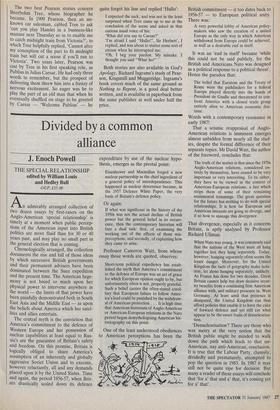Divided by a common alliance
J. Enoch Powell
THE SPECIAL RELATIONSHIP edited by William Louis and Hedley Bull OUP, 85.00 An admirably arranged collection of two dozen essays by first-raters on the Anglo-American 'special relationship' is timely at a moment when public percep- tions of the American input into British politics are more fluid than for 30 or 40 years past, and may play no small part in the general election that is coming.
Chronologically arranged, the collection documents the rise and fall of those ideas by which successive British governments and their permanent advisers have been dominated between the Suez expedition and the present time. The American hege- mony is not based so much upon her physical power to intervene anywhere in the world — the limits of that power have been painfully demonstrated both in South East Asia and the Middle East — as upon the beliefs about America which her satel- lites and allies entertain.
The central myth is the conviction that America's commitment to the defence of Western Europe and her possession of nuclear capabilities at least equal to Rus- sia's are the guarantee of Britain's safety and freedom. On this premise, Britain is logically obliged to share America's assumption of an inherently and globally aggressive Soviet Union and to execute, however reluctantly, all and any demands placed upon it by the United States. Time and again, the period 1956-57, when Brit- ain drastically scaled down its defence expenditure by use of the nuclear hypo- thesis, emerges as the pivotal point:
Eisenhower and Macmillan forged a new nuclear partnership as the chief ingredient of a general policy of interdependence. This happened as nuclear deterrence became, in the 1957 Defence White Paper, the very basis of Britain's defence policy.
Or again: If what was significant in the history of the 1950s was not the actual decline of British power but the general belief in its occurr- ence, then the contemporary historian will face a dual task: first, of examining the working out of the effects of those mis- perceptions, and secondly, of explaining how they came to arise.
Professor Cameron Watt, from whose essay those words are quoted, observes:
Short-term political expediency has estab- lished the myth that America's commitment to the defence of Europe was an act of grace for which European opinion ought to be, but unfortunately often is not, properly grateful. Such a belief carries the often-stated corol- lary that European failure to follow Amer- ica's lead could be punished by the withdraw- al of American protection . . . It is high time that American historians of Anglo-American or American-European relations in the Nato period began demythologising American his- toriography on this point.
One of the least understood obediences to American perceptions has been the British commitment — it too dates back to 1956-57 — to European political unity. There was:
A very powerful lobby of American policy- makers who saw the creation of a united Europe as the only way in which American withdrawal from Europe could be achieved, as well as a desirable end in itself.
It was an 'end in itself because 'while this could not be said publicly, for the British and Americans Nato was designed as a political response to a political threat'. Hence the paradox that:
The belief that Euratom and the Treaty of Rome were the pathfinders for a federal Europe played directly into the hands of President de Gaulle and threatened to con- front America with a closed trade group entirely alien to American economic doc- trine.
Words with a contemporary resonance in early 1987!
That a seismic reappraisal of Anglo- American relations is imminent emerges almost unbidden from nearly all the stud- ies, despite the formal difference of their separate topics. Mr David Watt, the author of the foreword, concludes that:
The truth of the matter is that since the 1970s Anglo-American relations, considered en- tirely by themselves, have ceased to be very important or very interesting. To be either, they have to be viewed in the context of American-European relations, a fact which strips them of some of their remaining sentimental trimmings. The great question for the future has nothing to do with special relationships. It is how far European and American interests are going to diverge, and if so how to manage this divergence.
That divergence, especially as it concerns Britain, is aptly analysed by Professor Richard Ullman.
When Nato was young, it was commonly said that the nations of the West must all hang together lest they hang separately. Today, however, hanging separately often seems the lesser danger. Moreover, for the United Kingdom the facts of geography make isola- tion, let alone hanging separately, unlikely. As France has done for two decades, Great Britain cannot help but draw decisive secur- ity benefits from a continuing firm American alliance with, and military presence in, West Germany. At least until that presence is dissipated, the United Kingdom can thus afford policies that enable it to have the cake of forward defence and yet still eat what appear to be the sweet fruits of denuclearisa- tion.
Denuclearisation'! There are those who wax merry at the very notion that the British public might be minded to walk down the path which leads to that un- American, nay anti-American, conclusion. It is true that the Labour Party, clumsily, dividedly and prematurely, attempted to pop the question in 1983. In 1987 it may still not be quite ripe for decision. But many a reader of these essays will conclude that `for a' that and a' that, it's coming yet for a' that'.



































 Previous page
Previous page